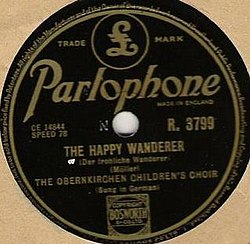The Happy Wanderer
This article needs additional citations for verification. (May 2018) |
You can help expand this article with text translated from the corresponding article in German. (May 2018) Click [show] for important translation instructions.
|

"The Happy Wanderer" ("Der fröhliche Wanderer" or "Mein Vater war ein Wandersmann") is a popular song. The original text was written by Florenz Friedrich Sigismund (1788–1857).[1][2] The present tune was composed by Friedrich-Wilhelm Möller shortly after World War II. The work is often mistaken for a German folk song, but it is an original composition. Möller's sister Edith conducted a small amateur children's and youth choir in Schaumburg County, Northern Germany, internationally named Obernkirchen Children's Choir, in Germany named Schaumburger Märchensänger.[3] She adapted Sigismund's words for her choir.[1]
In 1953, a BBC radio broadcast of the choir's winning performance at the Llangollen International Musical Eisteddfod turned the song into an instant hit. On January 22, 1954, the song entered the UK singles chart and stayed on the chart—only a Top 12 at the time—for 26 non-consecutive weeks, peaking at Number 2 (for five consecutive weeks). The amateur choir, many of whose original members were war orphans, turned into an international phenomenon in the following years. The group performed on many international tours under the name Obernkirchen Children's Choir and recorded several albums. They made two appearances on The Ed Sullivan Show (November 29, 1964, and December 11, 1966). Die Isarspatzen, Herbert Beckh und das Tanzorchester des Bayerischen Rundfunks have also recorded a German version. That version was made in Munich on June 16, 1954. It was released by Electrola as catalog number EG 8073.
The song's German lyrics have been translated into several languages, and it has since become a choir classic. The first adaptation into another language was done by a Belgian woman, Andrée Mazy, who came up with versions in Dutch-Flemish and French.[4] Since in Dutch folk songs "valderi-valdera" (pronounced "falderi-faldera") is more common than the German "falleri-fallera", she used the Dutch model in both versions. When Antonia Ridge was writing the English lyrics,[5] she became acquainted with the French version of the song, with "valderi-valdera", pronounced with a true soft /v/ instead of the voiceless /f/, and borrowed it o into the English version a she considered it less military sounding.[6][7]
Milton DeLugg wrote an arrangement, and is sometimes incorrectly credited as the composer of the song. A number of English-language sources credit Edith Möller and Florenz Siegesmund with writing the words, the implication being (apparently) that they were written at the same time as the tune. However, the German sources all credit the original words to either Friedrich Sigismund,[8] F. Sigismund,[9] or Florenz Friedrich Sigismund[2] and give the dates as either 1788-1857 or early 19th century.[10] All German sources agree that the words to the popular version were adapted by Edith Möller.
The song also became the unofficial anthem of Major League Baseball's Montreal Expos (since relocated to become today's Washington Nationals).[11][12]
References
- ^ a b "Mein Vater war ein Wandersmann," on Volksliederarchiv (+score)
- ^ a b TOBIAS WIDMAIER: "Mein Vater war ein Wandersmann," on Volkslieder als Therapie bei Demenzerkrankungen (Alzheimer)
- ^ "Herzlich willkommen". Musikschule Schaumburger Märchensänger.
- ^ Published Music: Catalog of Copyright Entries, 3rd Series, Vol. 9, Part 5A, No 1, P. 185, EFO-32388, Washington, D.C.: Library of Congress, January–June 1955.
- ^ Published Music: Catalog of Copyright Entries, 3rd Series, Vol. 9, Part 5A, No 1, P. 185, EP86723-24, Washington, D.C.: Library of Congress, January–June 1955.
- ^ "Happy Wanderer". Scout Songs.
{{cite web}}: Cite has empty unknown parameter:|1=(help) - ^ During WWII, a more military version of the song became immensely popular with the German paratroopers (Hans Niedermeier, Liederbuch der Fallschirmjäger. Bund Deutscher Fallschirmjäger, 1983).
- ^ (1) "Der fröhliche Wanderer". German folksong site maintained by Frank Petersohn in Canada.
(2) "Mein Vater war ein Wandersmann". Der Bierprügel Die Seite für Studentisches Liedgut. Archived from the original on October 29, 2013. - ^ Anding, Johann Michael. "Eine Seite von Hildburghäusern für Hildburghäuser".
- ^ "Search for "mein vater war ein wandersmann"". DeutschesLied.com.
- ^ Fischer, Doug (April 6, 2015). "The Montreal Expos: How the team of the '80s became nostalgia's team". The Ottawa Citizen. Retrieved December 14, 2019.
I was in Cooperstown that weekend [of the 2010 Baseball Hall of Fame induction ceremony]. I saw the Expos caps and sweatshirts on the village streets and in the bars, and the around-the-block lineups to get a Tim Raines autograph. I heard the Let's Go Expos chants and even a few choruses of the old team anthem, The Happy Wanderer — Valderi, Valdera, Valder-iiiii, Valder-ha-ha-ha-ha — coming from fans scattered on the lawn chairs at the induction ceremony.
- ^ Cowan, Stu (September 10, 2013). "Will Big O fans sing 'Val-deri, Val-dera!' for Jays vs. Mets?". The Montreal Gazette. Retrieved December 14, 2019.
See also
External links
- Chart Of All Time - 1954 UK Chart History of 1954
- IMDB Movie: "Der fröhliche Wanderer"
- Llangollen History of the Llangollen International Musical Eisteddfod
- Mein Vater ist ein Wandersmann by the Obernkirchen Children's Choir (1954). Licensed to YouTube. (video — 2:50 minutes). Published on June 2, 2015 — 19,920 views by July 20, 2019.
- The Happy Wanderer by the Frank Weir Choir (1954). Licensed to YouTube. (video — 2:43 minutes, with lyrics). Published on December 27, 2011 — 95,116 views by August 19, 2019.
- Mein Vater ist ein Wandersmann by Heidis Erben (2011). Licensed to YouTube. (video - 2:39 minutes). Published on August 28, 2011 — 116,856 views by July 20, 2019.
- Happy Wanderer from Campout at Walt Disney World. Via YouTube. (video — 2:46 minutes, with lyrics). Published on April 5, 2011 — 74,246 views by July 20, 2019.
- The Happy Wanderer by The Ringgold Band (2013). Via YouTube. (video — 6:02 minutes). Published on September 2, 2013 — 7,475 views by July 20, 2019.
